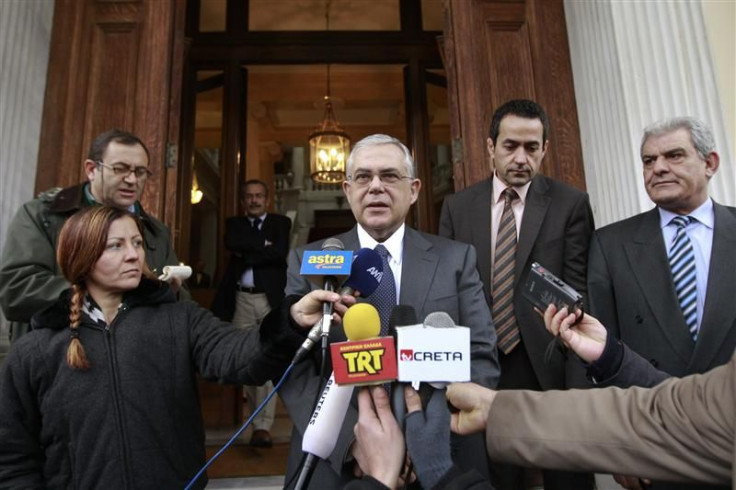Greeks Approve Bond Swap Needed for Bailout

(Reuters) - Greece took its first step toward reaping urgently needed funds agreed in a 130-billion-euro rescue package Thursday as its parliament endorsed a bond swap for private holders of its debt.
The swap, in which investors trade bonds for lower-value debt, is to be launched Friday with the aim of slicing 100 billion euros off liabilities worth 160 percent of national output that have brought the country to the brink of a chaotic bankruptcy.
By approving this law, parliament will allow us to start getting out of the vortex, Finance Minister Evangelos Venizelos told lawmakers earlier.
To succeed, we need to be united, serious, trustworthy, persistent and to work, work, work, he added before the debt swap law was passed thanks to the majority held by his Socialist PASOK party and their conservative New Democracy coalition partners.
Greece's second bailout since 2010 was sealed by euro zone finance ministers on Tuesday, averting the threat of a chaotic default next month but doing little to allay doubts about the country's long-term financial and social stability.
The package is no guarantee that the problems in Greece will be solved, Dutch Finance Minister Jan Kees de Jager told his own parliament in a letter.
Greece will have to take extensive measures and show that it implements the necessary reforms, said De Jager, who along with his German counterpart Wolfgang Schaeuble has led skepticism of Athens' commitment to knock its public finances into shape.
In an interview with the Wall Street Journal, European Central Bank President Mario Draghi suggested the muted market response to Tuesday's rescue deal suggested many doubted Athens would follow through on a promised austerity cure.
It's hard to say if the crisis is over, he warned.
In Berlin, a senior official of Chancellor Angela Merkel's ruling Christian Democrats said lawmakers due to vote on the bailout on Monday would make it dependent on the International Monetary Fund taking part as planned.
European and IMF sources have told Reuters the Fund could contribute 13 billion euros in new money on top of 9.9 billion still unpaid from the first bailout.
The extent of the IMF contribution still has to be discussed by the board, Gerry Rice, the Fund's director of external relations told a news conference in Washington. He too highlighted implementation risks.
BAILOUT FOES GAIN
The Greek government says the bond swap must be completed by March 12, before a March 20 deadline when 14.5 billion euros of debt repayments fall due.
Doctors and health workers joined a wave of public anger over tough budget cuts demanded as the price for the bailout, launching a 24-hour strike over pay cuts. Hospitals were maintaining a minimum level of service.
A 3-hour nationwide work stoppage is a planned for next Wednesday and left-wing parties opposed to the austerity package are gaining in opinion polls before elections likely in April.
Greece is the first colony of the euro zone, said Alexis Tsipras, leader of the Left Coalition party, complaining that new arrangements under which foreign inspectors will monitor national finances was a humiliating loss of sovereignty.
Government ministers maintain the only alternative would be bankruptcy and ejection from the euro single currency zone.
There would be chaos, Environment and Energy Minister George Papaconstantinou told weekly German newspaper Die Zeit.
There would be queues outside the banks and the army and the police would have to intervene. We would no longer be able to import oil, natural gas or medicines from abroad.
BUYING TIME
Private investors holding about 200 billion euros of Greek bonds will take a loss of 53.5 percent in the face value of their holdings and a real loss of 73-74 percent.
The legislation says investors get at least 10 days to consider the transaction and creates so-called collective action clauses (CACs), which force all bondholders to proceed with the swap once it has won a specified level of approval.
According to the law, the swap will go ahead once 50 percent of bondholders have responded to the offer and the CACs will be activated once a two-thirds majority of that quorum has voted in favour of the swap.
The austerity measures have helped to plunge Greece ever deeper into recession and driven unemployment up over 20 percent. Half of young Greeks are jobless.
The bailout deal buys time to stabilise the 17-nation euro zone currency bloc and strengthen its financial protection against a Greek default, which is a long-term threat.
The euro zone, and particularly northern members, are deeply sceptical that Greek leaders will stick to the painful spending cuts and reforms after the election.
A new survey by pollster VPRC for the Epikera magazine on Thursday showed 76 percent of respondents believed Germany was on balance rather hostile to Greece, and 73 percent said they had a negative attitude towards Chancellor Angela Merkel. The telephone survey was taken from a sample of 805 people.
Greece must adopt a series of laws in the coming days needed to implement some 3.3 billion euros of cuts to public sector spending and pensions.
(Additional reporting by Dina Kyriakidou in Athens and Lesley Wroughton in Washington; Writing by Mark John; Editing by Paul Taylor)
© Copyright Thomson Reuters 2024. All rights reserved.





















